At what age should I take my child to the dentist?
The Centre Médico-Dentaire Balexert Genève has set up a whole program to support and assist you with your child's hygiene from birth.
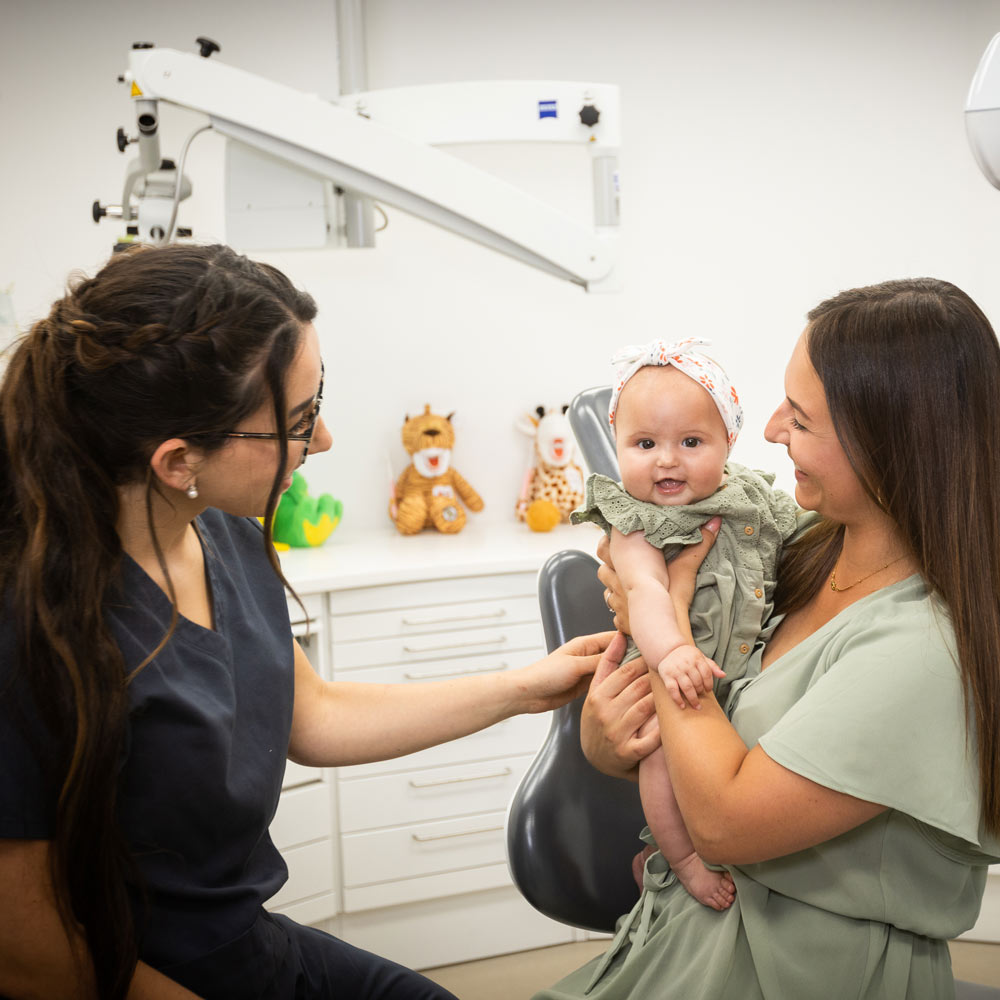
The first consultation
A first visit to the pedodontist (child dentist) is ideally recommended even before the first tooth erupts in your child’s mouth.
This initial consultation is intended for new parents. Its purpose is to advise them on how to adopt good oral hygiene habits for their children, right from birth: How should they brush their teeth? Which toothpaste to use? What drinks can they give them, and at what time of day? What are the recommended snacks that are safe for teeth?
Depending on family habits, the age at which the first teeth erupt or the child’s compliance, a time interval for visits to your child’s dentist will be determined with the parents.
These recurring appointments at variable intervals serve, among other things, to adapt oral hygiene measures according to growth, to diagnose oral pathology at an early stage and, if necessary, to refer your child to another specialist: prophylaxis assistant, hygienist, orthodontist…
These regular visits are very important for gradually building up a relationship of trust between child and dentist. This trust is essential if the child is to feel secure and, if need be, accept any therapeutic procedures that may prove necessary.
Essential visits to your pediatric dentist
During a child’s growth, dental check-ups are strongly recommended at certain ages for early diagnosis. At these times, there are therapeutic windows for minimally invasive interventions.
During these consultations, the pediatric dentist will also take the opportunity to update the child’s individual habits: dental hygiene, introduction of interdental cleaning, consumption of sugary foods or drinks, helping to stop loafing…
Here are the recommendations for a consultation:
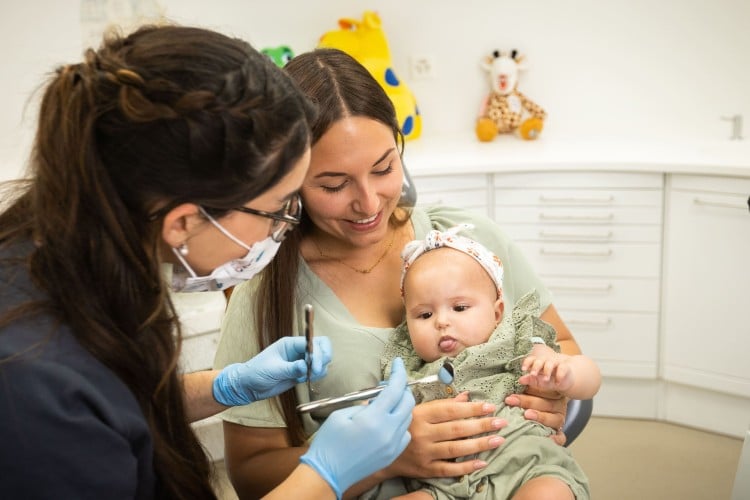
Already during pregnancy or in the child’s first year of life, the pediatric dentist can explain to parents how to clean the gums (even if there are no teeth yet) and which behaviors are to be avoided from the first months of life: sugar consumption, sharing spoons within the family… As well as preparing the introduction of brushing with the right toothpaste as soon as the first teeth appear.
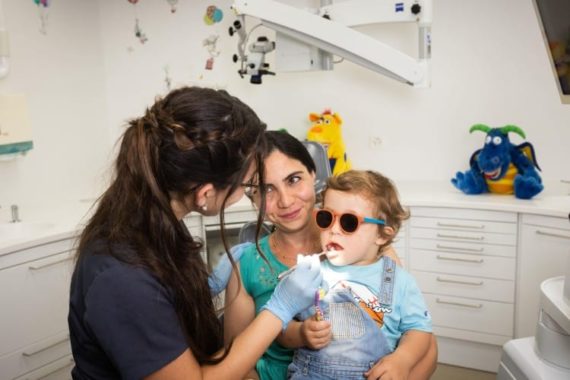
Over the course of the second year of life, children become increasingly cooperative, with a growing understanding of the pediatric dentist’s role and explanations. A relationship of trust begins to develop, enabling an initial quality check of baby teeth. At this stage, X-rays are not necessarily necessary. A visual check with an intraoral camera is usually sufficient. The condition of the dentition, the quality of the enamel and the position of the teeth merit particular attention at this time.
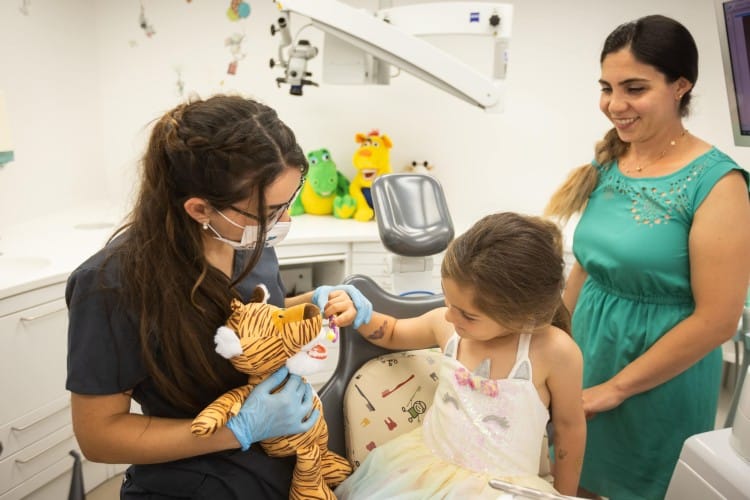
At the age of 6-7 years when the first adult teeth erupt: a hygiene check to avoid any carious evolution of the permanent teeth is essential! It’s also important to assess the quality of the permanent molars (enamel damage) and their position on the dental arch. The pediatric dentist will adapt daily dental hygiene habits and may introduce, if indicated, interdental cleaning or more intensive fluoridation of these teeth.
As soon as the permanent molars appear, certain preventive treatments may be indicated: long-term surface protection of permanent teeth, professional fluoridation…
Children become increasingly independent in their brushing, but parental help is still essential to properly clean the permanent teeth as they erupt in the mouth.
In some cases of dental malposition, it may already be necessary to refer the child to an orthodontist with the aim of preventing certain complications or improving masticatory function.
- At the age of 8 : this is the time when the dental transition phase begins, with the gradual replacement of milk teeth by permanent teeth. It is then important to consolidate, in collaboration with our dental hygienists or prophylaxis assistants, dental hygiene techniques: the child becomes more independent in brushing teeth and can start to become self-sufficient.
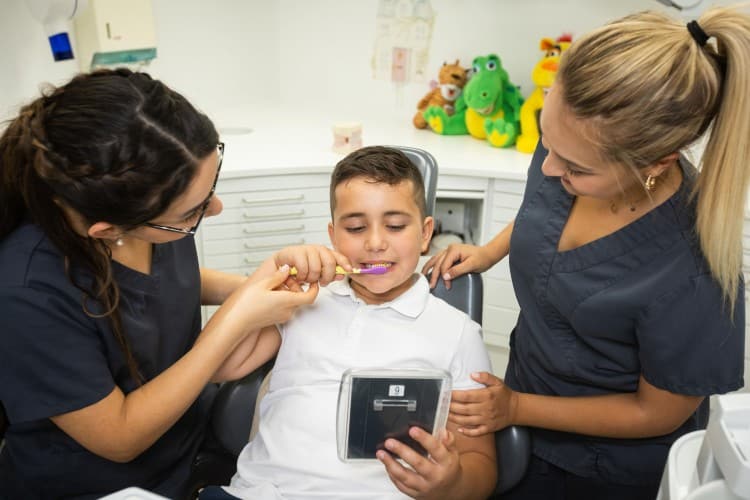
Between 10-12 years: this is the time when all baby teeth are replaced by adult teeth. It’s always important to insist on hygiene techniques to prevent any risk of caries. This is also usually the time for the first orthodontic consultation to assess the position of the teeth. Proper alignment of the teeth will not only ensure good chewing function, but also good dental aesthetics.
When undergoing orthodontic treatment, it’s not easy to maintain good dental hygiene with braces. It is therefore essential to maintain regular contact with your child’s dentist and prophylactic assistant.
- Between the ages of 16 and 18: orthodontic treatment is complete and the child is free of braces. It is therefore advisable to carry out a full diagnosis at the end of orthodontic treatment, including a check for the absence of cavities. This is also the right age to screen for the presence of wisdom teeth and assess a possible indication for their extraction.
Your support at the Centre Médico-Dentaire Balexert :
At the end of each consultation, the pediatric dentist will explain to parents and children the main points to remember from the consultation, using simple words adapted to different ages.
The pediatric dentist will then guide you in understanding and implementing the hygiene habits to be adopted.
You can then easily schedule the necessary check-ups with the children’s dentist and any other practitioners. At the Centre Médico-Dentaire Balexert in Geneva, you’ll find all the specialties you need to ensure your child’s oral health right through to adulthood.
All treatments are explained to you in detail, especially if you need to see another specialist such as a dental hygienist, orthodontist or oral surgeon. All treatments are also systematically quoted to ensure complete transparency.